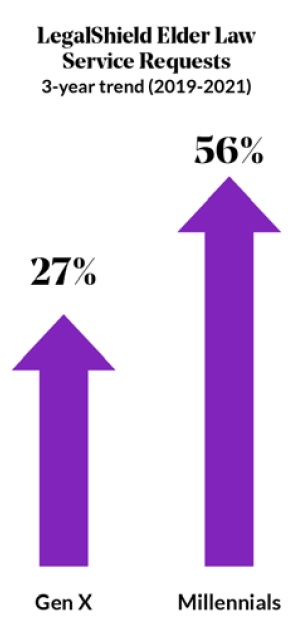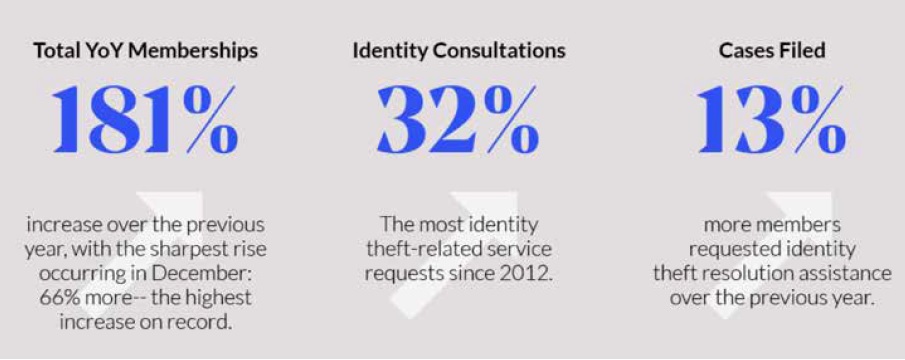Providing peace of mind is priceless
BY EMILY ROSE
In early 2020, the world changed. We experienced a fast, dramatic global transformation; every person, in every walk of life, was impacted, both personally and professionally.
Like many professionals, I was suddenly spending much more time at home due to remote work and travel bans. My spouse was similarly impacted, as were our children who abruptly began attending school in front of their computers. Several folks on my block, also homebound, saw the shortcomings of their abode, and with interest rates so favorable, decided it was time to scale up to more spacious living quarters. A friend who lives down the street launched a major home renovation and is now locked in a legal battle with the contractor. Another neighbor is embroiled in a battle over the loss of her mother and the care she claims her mother should have received but didn’t.
My personal circle is a microcosm of the new socioeconomic environment: Millions of people experiencing varying degrees of stress, some of which carry potential legal implications.
Recent data reported in Pre-Paid Legal Services, Inc. (PPLSI)’s latest whitepaper (https://bit.ly/3CnsRpX) verifies the pandemic’s impact on personal needs. In 2020, our group voluntary legal plan, LegalShield, saw an overall 7.5% year-over-year increase in service requests, accompanied by more dramatic utilization spikes in the following areas of law:
- Estate Planning: up 26% as uncertainties brought by the pandemic prompted more members to ensure peace of mind for themselves and their families.
- Landlord/Tenant: up 22% due in large part to widespread job losses, driving member requests for help when unable to pay rent.
- Family Law: up 22% as families struggled to adapt to remote work, education, and countless other stresses.
- Consumer Finance: rose 13% as more members struggled with collections, taxes, billing disputes, and other matters.
Legal needs among Millennials (26-41 years) and Gen Z (10 – 25 years) members soared in 2021
According to Caring.com’s 2021 Wills and Estate Planning Study, the number of young adults with a will increased by 63%, and 18 to 34-year-olds were, surprisingly, 16%more likely to have a will than 35to 54-year-olds (https://www.caring.com/caregivers/estate-planning/wills-survey/). Again, this demand was reflected in LegalShield member requests. Over the past three years, requests for legal services focused on estate planning rose by 49% among Millennial members and 158% among Gen Z. Still more dramatic increases were seen among younger generations in other areas of law, particularly civil litigation, and landlord/tenant issues.

Taking care of mom and dad starts earlier
Related to estate considerations is the care of aging parents. Over the past three years, elder law requests among Gen X (42 – 57 years) have risen 27%, reaching a new five-year high. Even more significant is that elder law requests among Millennials have jumped up by 56%.
We anticipate this trend will continue in the years to come. In less than two decades, the inevitable graying of America will result in older adults outnumbering kids for the first time in U.S. history. Already, the middle-aged outnumber children, but the country will reach a new milestone in 2034 (previously 2035). That’s when the U.S. Census Bureau projects older adults edging out children in population size: 65 and older are expected to number 77 million, while 18 and under will number 76.5 million. (https://www.census.gov/library/stories/2018/03/graying-america.html)

More time online = higher incidents of identity theft
In addition to an increase in the request for legal services, PPLSI has seen a dramatic increase in the need for identity theft protection and restoration. Identity theft protection is another PPLSI area of expertise, as we offer IDShield as a group voluntary benefit, alongside LegalShield.
As remote work and education, social distancing, and corporate data mining escalated, cybercriminals saw a golden opportunity in obtaining the Personally Identifiable Information (PII) of unsuspecting individuals. According to the Federal Trade Commission (FTC), consumers in 2020 lost $3.3B due to identity fraud, nearly doubling from $1.8B in 2019. (https://www.ftc.gov/system/files/documents/reports/consumer-sentinel-network-data-book-2018/consumer_sentinel_network_data_book_2018_0.pdf).
The FTC received more than 167K reports from people claiming their information was misused on an existing account or stolen to open a new
credit card account. [Federal Trade Commission, New Data Shows FTC Received 2.2 Million Fraud Reports from Consumers in 2020, Feb. 2021. (https://www.ftc.gov/news-events/press-releases/2021/02/new-data-shows-ftc-received-2-2-million-fraud-reports-consumers).
These sobering statistics are reflected in the following 2020 IDShield service metrics cited below.
Legal and identity theft protection enhances employee peace of mind
The pandemic has impacted us all in more ways than taking stock in our physical health, causing us to take a closer look at our relationships, finances, and even our career choices. Americans have been quitting their jobs in record numbers for reasons ranging from fear of COVID-19 to reliance on government assistance, from job burnout and dissatisfaction to early retirement.
This trend, dubbed “The Great Resignation,” has shifted power to ambitious personnel who are now positioned as strong job candidates across a wide range of industries. The new workplace power dynamics are intensifying pressure on companies to provide greater value to employees.
Companies winning the talent war are offering location flexibility along with competitive compensation packages and comprehensive, customizable benefits that address total well-being. Voluntary legal, identity theft, and online privacy protection plans help round out benefits packages at little to no cost to employers. Employees can enroll at significantly lower rates than they would incur as direct buyers and obtain the financial and online security needed in today’s socioeconomic landscape.
Even before the pandemic, employees placed significant value on these benefits. According to PPLSI’s 2019 Workplace Study (https://hr.legalshield.com/financialwellness) among randomized, non-member employer groups:
- 61% of employees faced a legal event in 2018 and 2019. Among that group, 39% made phone calls during the workday to resolve the event, 34% reported being distracted at work, and 30% took time off, all to deal with personal legal matters
- 79% of employers reported a positive response from employees after implementing a legal plan
- 89% of employees felt that owning an identity theft product would provide peace of mind
- 61% of employees thought that identity theft protection benefits increase financial well-being
- 51% expressed the desire for their employer to offer identity theft protection benefits as part of their company’s benefits package.

Legal service and IDT benefit critical features
When adding a voluntary legal plan to your company’s benefits portfolio, make sure it offers a high-quality provider network giving employees direct access to legal services at a reduced cost. Provider network lawyers should specialize in a wide range of personal legal matters including consumer finance, bankruptcy, estate planning, family law, landlord/tenant, real estate and other categories.
A voluntary identity protection plan should give employees direct access to IDT specialists to address any identity theft or online privacy concerns. In the event of identity theft, dedicated licensed private investigators will restore an employee’s identity to its pre-theft status. It should also offer comprehensive data monitoring and real-time alerts, multi-device protection, and a reputation and privacy management tool.
Both benefits should include these key features:
- Ease of administration: Dedicated, immediately accessible account managers, customizable group benefits websites, forward-thinking enrollment materials, custom HR portals, and the ability to integrate with top benefit administration platforms.
- Ease of use for employees: Employees should not have to submit claim forms when using the benefit or have waiting periods, deductibles, co-pays, or other surprise fees. Nor should they need to research or make separate reach-outs to lawyers or IDT professionals to assess who will take their case.
- Versatile mobile app: Allows employees to manage their accounts, view their benefits, and request service from anywhere.
It is important to provide both a legal and IDT benefit, as these benefits can work hand in hand when an identity theft matter becomes a legal matter.
Working with a carrier who provides both benefits allows for seamless usage for IDT matters that require legal counsel.
Adaptable companies are successful companies; they attract the best employees, which create the best products and services, which coming full circle, makes them successful companies. Prevailing conditions have placed even more pressure on HR teams, to attract and retain the best employees. Enhanced benefits are a tremendous way to achieve these outcomes.
To learn more, please download a copy of PPLSI’s new whitepaper: Navigating the New Socioeconomic Landscape: How Legal and Identity Theft Protection Benefits Enhance Employee Well-being (https://bit.ly/3CnsRpX).

EMILY ROSE is SVP, Broker & Partnership Sales for PPLSI’s Business Solutions Division. Emily has more than 15 years of experience in the voluntary benefits space, including group legal plans, identity theft and online privacy protection plans, supplemental health and property and casualty. https://www.pplsi.com.
